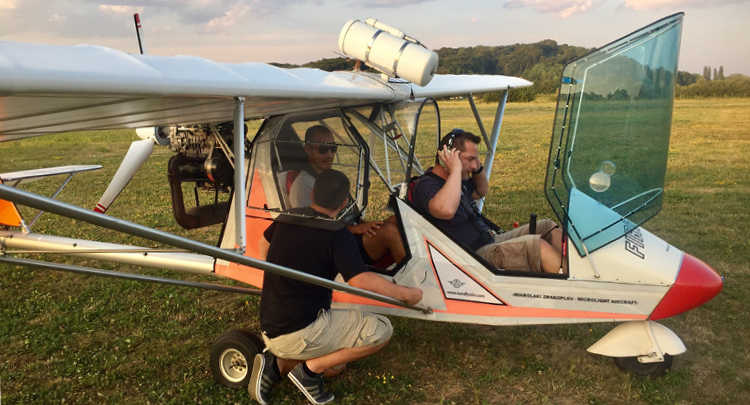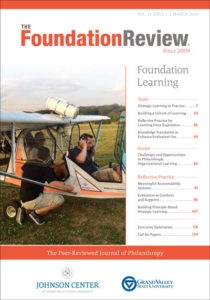Learning in Foundations


 In the philanthropic sector, learning is a frequent topic of conversation, but often it is not clear what we mean by “learning” and even less often is it clear how to do it. Foundation staff are admonished to evaluate, reflect, and learn about past efforts — but to also keep up-to-date on emerging issues and opportunities. What was learned about prior work that can be applied in a new setting, scaled up, or used with a different population? In a multi-year initiative, how does the foundation make mid-course corrections?
In the philanthropic sector, learning is a frequent topic of conversation, but often it is not clear what we mean by “learning” and even less often is it clear how to do it. Foundation staff are admonished to evaluate, reflect, and learn about past efforts — but to also keep up-to-date on emerging issues and opportunities. What was learned about prior work that can be applied in a new setting, scaled up, or used with a different population? In a multi-year initiative, how does the foundation make mid-course corrections?
As we all know, the social problems that foundations address are complex, with many interacting parts. Poverty, homelessness, poor health — these inter-related outcomes have equally inter-related causes. Particularly in place-based change work, where understanding context is critical, learning IS the key strategy for creating change (Patrizi, Thompson, Coffman, and Beer, 2013).
While foundation staff need a theory to guide action, they must also be willing to deviate from the plan when there is evidence that it isn’t working or when a better way emerges. (As science fiction writer Robert Heinlein said, “Belief gets in the way of learning.”)
Many in the philanthropic world are grappling with the challenges of learning by developing tools and frameworks to support it. Authors in the current issue of The Foundation Review: Foundation Learning share their approaches to internal foundation learning. Our next issue, due out mid-summer, will focus on collaborative learning — how foundations learn with communities, other funders, and networks.
Carr, Hembree, and Madden provide a case study of the Ewing Marion Kauffman Foundation’s approach to cultivating staff “learning champions.” They also created simple tools and processes to capture lessons generated internally and externally, and provided training in facilitation techniques to ensure insights are connecting back into strategies to drive decision-making.
Clarke, Preskill, Stevenson, and Schwartz describe the work of Kaiser Permanente Community Health to develop and implement a system called Measurement and Evaluation for Learning and Outcomes. The system includes starting with learning questions and developing learning plans.
One of the often-stated reasons for the lack of systematic learning in foundations is a lack of time. Jaffe argues that foundation leadership and staff can put their own experience and expertise into play as a learning strategy through reflective practice.
Rogers and Malla address how essential information about monitoring, evaluation, and lessons learned can be made available to foundations. The Fred Hollows Foundation introduced participatory, real-time monitoring, evaluation, and learning bulletins grounded in the principles of knowledge translation. They suggest that this approach may be particularly suitable for foundations that have limited resources.
Chubinski, Adcock, and Sprigg interviewed learning, evaluation, and research officers in philanthropy across the country to identify points of struggle and opportunities for improvement in organizational learning, as well as what can be learned from mistakes in the process.
Holley and Parkhurst explore what is often seen as a tension between learning and accountability. They identify perspectives that can hold foundations back from full engagement in internally driven accountability initiatives, and offer practical guidance on how to shift these mindsets to more productive practices.
Many foundations rely on external consultants to assess the impacts of their work. Nolan, Long, and Pérez argue that these evaluators play a critical role in supporting philanthropic learning, programming, and strategy. However, most philanthropic evaluation is focused on the needs of individual foundations. These authors argue that evaluators and funders can do more to build the collective capacity of evaluators working in philanthropy in order to enhance their contributions to community change.
Price, Reid, and Kennedy Leahy offer three principles for strategic learning, informed by the field and insights from practice across three foundations. Each principle is explored in terms of what it means and why it is important, along with examples from how it could look in practice.
In an oft-cited quote, the philosopher Eric Hoffer said, “In times of change, learners inherit the earth, while the learned find themselves beautifully equipped to deal with a world that no longer exists.” The articles in this issue have created and tested in their own work tools, frameworks and — perhaps most importantly — shifts in mindset that can promote learning. The shift from the foundation as expert to foundation staff as learners is the first step toward developing a deep learning practice that can foster deeper impact and relevancy.
We are grateful to the Gordon and Betty Moore Foundation, the Walton Family Foundation, the McKnight Foundation, and the Kauffman Foundation for their sponsorship of this issue, which allows us to make the entire issue open access.
Patrizi, P., Thompson, E., Coffman, J. & Beer, T. (2013). Eyes wide open: Learning as strategy under conditions of complexity and uncertainty. The Foundation Review, 5(3), 50–65. https://doi.org/10.9707/1944-5660.1170